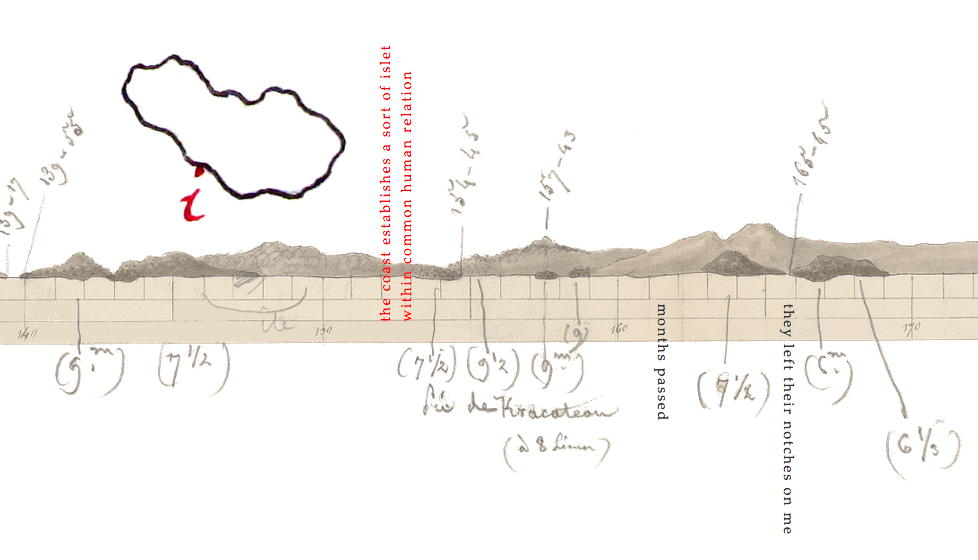Meeting the moment in the time of pandemic
Donna McKinnon - 14 September 2020

J. R. Carpenter, The Pleasure of the Coast (2019)
It’s pure coincidence that J.R. Carpenter, whose artistic and literary practice has been largely online, assumes the role of the Department of English and Film Studies’ 2020-21 Writer-in-Residence at a time when classrooms at the University of Alberta and around the world have gone online.
Carpenter has been using the internet as a ‘medium for creation and dissemination of experimental texts’ for two decades. Her pioneering works of digital literature have been exhibited, published, presented, and performed. More recently, she has taught online courses through the Poetry School in London. She is uniquely prepared to take on the challenge of delivering instruction and mentorship in a digital space.
And yet, when the Canadian-born, UK-based writer was given the option to stay in England while providing writing consultation online to students and staff in her role as Writer-in-Residence, she chose to come to Edmonton. Having spent almost 20 years in Montreal before emigrating to the United Kingdom in 2009, she knew little about Edmonton.
“I felt I needed to be here for a bunch of reasons,” explains Carpenter, who says that finding an apartment in an unfamiliar city in the middle of a pandemic was “surreal”. However, through a series of connections she was able to rent a suite in the house of someone who teaches at the university. Its proximity to the river, also a coincidence, was ideal.
“A lot of my work, especially in recent years, has to do with physical landscapes and associations with water,” she says. “In a kind of embodied way, it has been really interesting to walk down by the river, poke around and get a tiny bit lost and quite muddy, and try to figure out the geology. I keep coming home with bags of stones, and even in winter to have that kind of great outdoors right there, that's safe in terms of distance, I feel that's really important.”
After quarantining for two weeks in late August, Carpenter began to explore her surroundings with the help of the previous Writer-in-Residence, Darrin Hagen. They hope to collaborate on a project that goes beyond a typical Zoom reading to something more experimental.
While Carpenter comes to writing through a wide range of backgrounds, her approach to teaching and mentoring and to her own work is, in her words, very process-oriented.
“I'm not formed by strict literary forms, but I've written all of them,” says Carpenter. “I’ve written a novel, I've won a number of short story awards. I won an award for creative nonfiction, but I don't teach in that way. My approach is through process, often through iteration and all kinds of processes to try to figure out the question the work is trying to answer, and how best to answer that question.”
In 1995, Carpenter began making her first, web-based work, following in the spirit of the small, self-produced magazines (known colloquially as “zines”) she had created while studying art at Concordia University in Montreal. As a student, she didn’t know it was possible to study writing, although she always wrote, starting professionally with exhibition catalogues and art reviews. Working in the visual arts slide library as a student at Concordia gave her access to the photocopier, which she used to make her first zines, combining imagery and collage and lines of poetry into new forms of creative expression. It wasn’t the technology, per se, that drew her in but the opportunity to make what she wanted to make, following the process through to its organic end.
It was zines that she turned to again when the pandemic hit the UK in early March. She says the “down and dirty, very straightforward art form” is her first response to a crisis. The result was it’s not true, it’s a zine.
“We were all already online and communicating our brains out and texting all the time, but I wanted to have a more physical experience of making and sending things out,” she says. “There was an excerpt in one of my most recent web-based works, The Pleasure of the Coast, and it was a sort of a castaway text. I thought, oh, castaway, stranded on an island, perfect for isolation! It's a slightly dark theme, but it really worked.”
As part of the eight-month residency, Carpenter will also have time to work on her own self-guided project. She says it will likely be closely associated with the land and the water, involving a consideration of the tar sands, particularly in terms of climate change, migratory labour, the disruption of migratory patterns, and species migration. As a migrant ‘three or four times over”, the subject of place and displacement is a powerful and constant thread in Carpenter’s life and work.
She is also thinking about different ways to engage with students.
“I think it's important for them to understand that although you're supposed to have a plan, it only gets you so far,” says Carpenter. “You have to ditch the plan and just go with your gut and get down in the river, get muddy and start poking it out.”
J.R. Carpenter is available for writing consultation Monday, Tuesday, and Wednesday by appointment.
Email: jrcarpen@ualberta.ca.
Read more about J.R. Carpenter on her website.
The Writer-in-Residence Program is a year-long residency, from September 1st to May 31st, which for the last forty years has brought acclaimed writers from across Canada to Edmonton. While here, the Writer-in-Residence has time to pursue their own writing projects, while keeping office hours two half-days a week for writing consultation with university staff and students, as well as the general public in and around Edmonton.